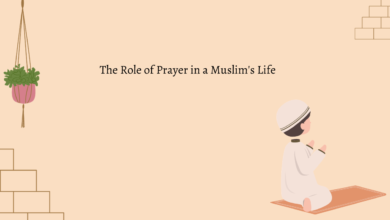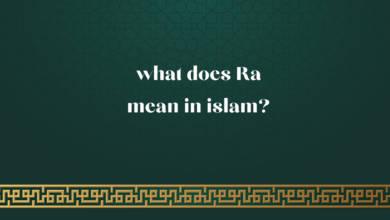
What is Azza in Islam?
Azza, in the context of Islam, refers to a concept of honor, dignity, and respect. It is associated with upholding the reputation and status of individuals, families, and the Muslim community as a whole.

Introduction
In Islam, the concept of respect for the deceased is deeply ingrained in its teachings and practices. One of the key ways this respect is expressed is through the ritual of “Azza.” Azza, a term derived from the Arabic word أعزَّة (I’zza), holds significant cultural and religious importance in Islamic societies. This practice embodies the reverence and honor shown to a departed soul and serves as a reminder of the transient nature of human existence.
The Meaning of Azza
Azza can be understood as a formalized process of mourning and commemoration that takes place following a person’s death. It involves various customs and traditions designed to demonstrate respect for the deceased, offer condolences to the grieving family, and bring the community together in a time of sorrow. Azza is primarily a cultural practice within Islamic societies, and its specific customs and traditions can vary across different regions and communities.
Also check
- Is life insurance Halal in Islam?
- What is oud in Islam?
- Angels of Islam
- What does the Quran say about converting to Islam?
- What Does Islam’s Holy Book Teach?
Key Aspects of Azza
- Gathering of Family and Friends: Azza typically begins with the gathering of family, friends, and community members at the home of the deceased or at a designated place. This gathering allows people to express condolences and support to the grieving family.
- Recitation of Quranic Verses: During Azza, Quranic verses and supplications are often recited. These verses may emphasize themes of patience, acceptance of God’s will, and the impermanence of life. The recitations serve as a spiritual reminder of the significance of the departed soul’s journey.
- Expressions of Grief: Mourning rituals, such as shedding tears, expressing sorrow, and remembering the virtues of the deceased, are an integral part of Azza. These expressions of grief are considered natural and are not discouraged in Islam.
- Charitable Acts: It is common for mourners to engage in acts of charity and kindness during Azza as a way of seeking blessings for the deceased. Donating to the less fortunate and performing good deeds in the name of the departed are believed to bring comfort to both the living and the deceased.
- Support for the Bereaved: The main purpose of Azza is to provide emotional and spiritual support to the bereaved family. Community members gather to share stories and memories of the deceased, providing comfort and reassurance during a difficult time.
- Community Unity: Azza serves as an occasion to strengthen the bonds of the community. By participating in the rituals, people come together to share their grief and offer solace to one another.
Respect for Tradition and Cultural Diversity

While the essence of Azza remains consistent across Islamic cultures, its customs and practices can vary based on regional and cultural influences. Different communities may have distinct ways of conducting Azza, incorporating their unique traditions and rituals. This diversity showcases the richness of Islamic culture and its ability to adapt to local customs while staying true to its core principles.
Conclusion
Azza in Islam is a poignant expression of respect, reverence, and support for the deceased and their grieving family. Through various rituals and traditions, this practice highlights the interconnectedness of the community and emphasizes the importance of compassion, unity, and the transient nature of human life. Azza serves as a reminder to Muslims that death is a reality that everyone will face, encouraging them to reflect on their own lives and actions while extending empathy and support to those who are mourning.
Frequently Asked Questions about Azza in Islam
What does “Azza” mean in Islam?
Azza, in the context of Islam, refers to a concept of honor, dignity, and respect. It is associated with upholding the reputation and status of individuals, families, and the Muslim community as a whole.
How is the concept of Azza important in Islam?
Azza emphasizes the importance of maintaining a positive reputation and honor for oneself, one’s family, and the broader Muslim community. It encourages avoiding actions or behaviors that could bring shame or disgrace.
Is Azza mentioned in the Quran or Hadith?
While the term “Azza” itself might not be explicitly mentioned, the concept of honor, dignity, and maintaining one’s reputation is present throughout the Quran and Hadith. Muslims are encouraged to act in a way that preserves their self-respect and the respect of others.
How does Azza relate to modesty and humility in Islam?
Azza complements the values of modesty and humility in Islam. While modesty and humility pertain to personal behavior and interactions, Azza focuses on how one’s actions reflect upon their own honor and the honor of their community.
What actions are considered to undermine Azza?
Actions that bring shame, disgrace, or harm to oneself or the community are considered to undermine Azza. This can include engaging in dishonesty, spreading false information, engaging in immoral behavior, and violating Islamic principles.
How can individuals protect and uphold Azza?
Individuals can protect and uphold Azza by living in accordance with Islamic values, avoiding harmful actions, speaking the truth, practicing honesty and integrity, and treating others with respect.
Is Azza relevant only in personal matters or in a broader societal context too?
Azza is relevant both in personal matters and in a broader societal context. It applies to personal conduct, family dynamics, community interactions, and interactions with non-Muslims.
Can Azza be misused to justify harmful practices, such as honor killings?
While the concept of Azza promotes positive values, it should never be used to justify harmful practices or violence. Islam condemns acts like honor killings, which go against the principles of justice and compassion.
How does Azza relate to forgiveness and repentance in Islam?
Islam encourages forgiveness and repentance. If someone errs or makes a mistake, they are encouraged to seek forgiveness from Allah and make amends. While Azza promotes honor, it is not meant to prevent individuals from seeking forgiveness and rectifying their mistakes.
How can communities promote Azza while avoiding judgmental attitudes?
Communities can promote Azza by fostering an environment of support, understanding, and empathy. While maintaining standards of behavior, it’s important not to adopt judgmental attitudes that alienate individuals and prevent them from seeking positive change.






